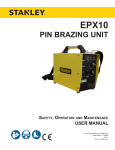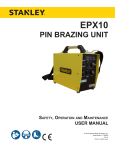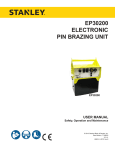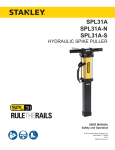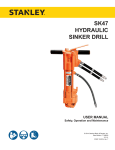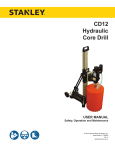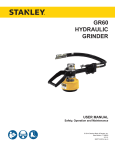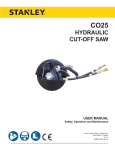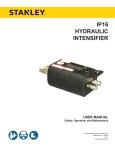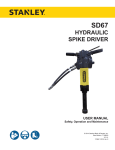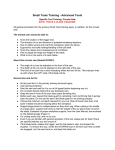Download HGE User Manual - Stanley Hydraulic Tools
Transcript
HGE12 CORDLESS INLINE ROTARY GRINDER USER MANUAL Safety, Operation and Maintenance © 2014 Stanley Black & Decker, Inc. New Britain, CT 06053 U.S.A. 73414 9/2014 Ver 3 2 ► HGE12 User Manual TABLE OF CONTENTS SAFETY SYMBOLS...................................................................................................................................................4 SAFETY ................................................................................................................................................................5 - 7 BATTERY AND CHARGER SAFETY.........................................................................................................................8 CHARGER SAFETY............................................................................................................................................9 - 10 OPERATION............................................................................................................................................................. 11 MAINTENANCE.......................................................................................................................................................12 SPECIFICATIONS....................................................................................................................................................13 IMPORTANT To fill out a Product Warranty Validation form, and for information on your warranty, visit Stanleyhydraulics.com and select the Company tab, Warranty. (NOTE: The warranty Validation record must be submitted to validate the warranty). SERVICING: This manual contains safety, operation, and routine maintenance instructions. Stanley Hydraulic Tools recommends that servicing cordless battery tools, other than routine maintenance, must be performed by an authorized and certified dealer. Please read the following warning. WARNING SERIOUS INJURY OR DEATH COULD RESULT FROM THE IMPROPER REPAIR OR SERVICE OF THIS TOOL. REPAIRS AND / OR SERVICE TO THIS TOOL MUST ONLY BE DONE BY AN AUTHORIZED AND CERTIFIED DEALER. For the nearest authorized and certified dealer, call Stanley Hydraulic Tools at the number listed on the back of this manual and ask for a Customer Service Representative. HGE12 User Manual ◄ 3 SAFETY SYMBOLS Safety symbols and signal words, as shown below, are used to emphasize all operator, maintenance and repair actions which, if not strictly followed, could result in a life-threatening situation, bodily injury or damage to equipment. This is the safety alert symbol. It is used to alert you to potential personal injury hazards. Obey all safety messages that follow this symbol to avoid possible injury or death. DANGER This safety alert and signal word indicate an imminently hazardous situation which, if not avoided, will result in death or serious injury. WARNING This safety alert and signal word indicate a potentially hazardous situation which, if not avoided, could result in death or serious injury. CAUTION This safety alert and signal word indicate a potentially hazardous situation which, if not avoided, could result in death or serious injury. CAUTION This signal word indicates a potentially hazardous situation which, if not avoided, may result in property damage. NOTICE This signal word indicates a situation which, if not avoided, will result in damage to the equipment. IMPORTANT This signal word indicates a situation which, if not avoided, may result in damage to the equipment. Always observe safety symbols. They are included for your safety and for the protection of the tool. LOCAL SAFETY REGULATIONS Enter any local safety regulations here. Keep these instructions in an area accessible to the operator and maintenance personnel. 4 ► HGE12 User Manual SAFETY PRECAUTIONS Product Safety Information: HGE12 Cordless Inline Rotary Grinder Product Description This Cordless Inline Rotary Grinder is a battery powered, hand-held, tool that is fitted with an inserted tool whose shank is clamped in a collet chuck. The inserted tool is typically a carbide burr, or stone permanently mounted on a shank or mandrel. The intent of this tool is for railroad signal communication, surface preparation essential for pin brazing applications on rail. Do not use this tool for applications other than what it is intended for. IF YOU HAVE ANY QUESTIONS OR COMMENTS ABOUT THIS OR ANY DEWALT TOOL, CALL US TOLL FREE AT: 1-800-4-DEWALT (1-800-433-9258) WARNING: To reduce the risk of injury, read the instruction manual. General Power Tool Safety Warnings WARNING! Read all safety warnings and instructions Failure to follow the warnings and instructions may result in electric shock, fire and/or serious injury. The term “power tool” in the warnings and safety refers to the battery-operated HGE12 (cordless) rotary grinder. 3) PERSONAL SAFETY a) Stay alert, watch what you are doing and use common sense when operating a power tool. Do not use a power tool while you are tired or under the influence of drugs, alcohol or medication. A moment of inattention while operating power tools may result in serious personal injury. b) Use personal protective equipment. Always wear eye protection. Protective equipment such as dust mask, non-skid safety shoes, hard hat, or hearing protection used for appropriate conditions will reduce personal injuries. c) Prevent unintentional starting. Ensure the switch is in the off position before connecting to battery pack, picking up or carrying the tool. Carrying power tools with your finger on the switch or energizing power tools that have the switch on invites accidents. d) Remove any adjusting key or wrench before turning the power tool on. A wrench or a key left attached to a rotating part of the power tool may result in personal injury. e) Do not overreach. Keep proper footing and balance at all times. This enables better control of the power tool in unexpected situations. f) Dress properly. Do not wear loose clothing or jewelry. Keep your hair, clothing and gloves away from moving parts. Loose clothes, jewelry or long hair can be caught in moving parts. g) If devices are provided for the connection of dust extraction and collection facilities, ensure these are connected and properly used. Use of dust collection can reduce dust-related hazards. 4) POWER TOOL USE AND CARE 1) WORK AREA SAFETY a) Keep work area clean and well lit. Cluttered or dark areas invite accidents. b) Do not operate power tools in explosive atmospheres, such as in the presence of flammable liquids, gases or dust. Power tools create sparks which may ignite the dust or fumes. c) Keep children and bystanders away while operating a power tool. Distractions can cause you to lose control. 2) ELECTRICAL SAFETY a) Do not expose power tools to rain or wet conditions. Water entering a power tool will increase the risk of electric shock. a) Do not force the power tool. Use the correct power tool for your application. The correct power tool will do the job better and safer at the rate for which it was designed. b) Do not use the power tool if the switch does not turn it on and off. Any power tool that cannot be controlled with the switch is dangerous and must be repaired. c) Disconnect the battery pack from the power tool before making any adjustments, changing accessories, or storing power tools. Such preventive safety measures reduce the risk of starting the power tool accidentally. d) Store idle power tools out of the reach of children and do not allow persons unfamiliar with the power tool or these instructions to operate the power tool. Power tools are dangerous in the hands of untrained users. HGE12 User Manual ◄ 5 SAFETY PRECAUTIONS e) Maintain power tools. Check for misalignment or binding of moving parts, breakage of parts and any other condition that may affect the power tool’s operation. If damaged, have the power tool repaired before use. Many accidents are caused by poorly maintained power tools. f) Keep cutting tools sharp and clean. Properly maintained cutting tools with sharp cutting edges are less likely to bind and are easier to control. g) Use the power tool, accessories and tool bits, etc. in accordance with these instructions, taking into account the working conditions and the work to be performed. Use of the power tool for operations different from those intended could result in a hazardous situation. 5) BATTERY TOOL USE AND CARE a) Recharge only with the charger specified by the manufacturer. A charger that is suitable for one type of battery pack may create a risk of fire when used with another battery pack. b) Use power tools only with specifically designated battery packs. Use of any other battery packs may create a risk of injury and fire. c) When battery pack is not in use, keep it away from other metal objects like paper clips, coins, keys, nails, screws, or other small metal objects that can make a connection from one terminal to another. Shorting the battery terminals together may cause burns or a fire. d) Under abusive conditions, liquid may be ejected from the battery; avoid contact. If contact accidentally occurs, flush with water. If liquid contacts eyes, additionally seek medical help. Liquid ejected from the battery may cause irritation or burns. 6) SERVICE a) Have your power tool serviced by a qualified repair person using only identical replacement parts. This will ensure that the safety of the power tool is maintained. 6 ► HGE12 User Manual Additional Specific Safety Rules for Cordless Rotary Grinder Tools • Hold power tools by insulated gripping surfaces when performing an operation. WARNING: After changing bits or making any adjustments, make sure the collet nut is securely tightened to avoid injury. WARNING: Do not press spindle lock or collet lock buttons while motor is running. The operator may lose control and drop the tool. Personal injury or serious tool damage may result. CAUTION: Do not touch the bit or collet nut during or immediately after cutting material. The bit and collet nut may be hot enough to burn bare skin. • Do not run tool while carrying at your side. The spinning bit may become entangled with clothing and injury may occur. • Always wear eye protection. Dust mask and hearing protection must be used for appropriate conditions. Using personal safety devices is recommended. WORK SAFE. • Do not use this tool with drill or screwdriver bits. This tool is not intended to be used as a drill or screwdriver. • Be sure your cutting bits are sharp and in good condition. Damaged bits can cause the tool to jump, injuring the operator. • Never touch the bit immediately after use. It may be extremely hot. • Be sure that the motor has stopped completely before you lay the tool down. If the cutter head is still spinning when the tool is laid down, it could cause injury or damage. • Be sure that the bit is clear of the work piece before starting motor. If the bit is in contact with the work piece when the motor starts it could make the tool jump, causing damage or injury. • If your tool fails to function properly, take it to an authorized service center. There are no user serviceable parts inside this tool and it should only be opened by trained service personnel. WARNING: ALWAYS use safety glasses. Everyday eyeglasses are NOT safety glasses. Also use face or dust mask if cutting operation is dusty. ALWAYS WEAR CERTIFIED SAFETY EQUIPMENT: • ANSI Z87.1 eye protection (CAN/CSA Z94.3), • ANSI S12.6 (S3.19) hearing protection, • NIOSH/OSHA/MSHA respiratory protection. SAFETY PRECAUTIONS WARNING: Some dust created by power sanding, sawing, grinding, drilling, and other construction activities contains chemicals known to cause cancer, birth defects or other reproductive harm. Some examples of these chemicals are: • Lead from lead-based paints, • Crystalline silica from bricks and cement and other masonry products, and • Arsenic and chromium from chemically-treated lumber (CCA). Your risk from these exposures varies, depending on how often you do this type of work. To reduce your exposure to these chemicals: work in a well ventilated area, and work with approved safety equipment, such as those dust masks that are specially designed to filter out microscopic particles. • Avoid prolonged contact with dust from power sanding, sawing, grinding, drilling, and other construction activities. Wear protective clothing and wash exposed areas with soap and water. Allowing dust to get into your mouth, eyes, or lay on the skin may promote absorption of harmful chemicals. WARNING: Use of this tool can generate and/or disburse dust, which may cause serious and permanent respiratory or other injury. Always use NIOSH/ OSHA approved respiratory protection appropriate for the dust exposure. Direct particles away from face and body. WARNING: Always wear proper personal hearing protection that conforms to ANSI S12.6 (S3.19) during use. Under some conditions and duration of use, noise from this product may contribute to hearing loss. CAUTION: When not in use, place tool on its side on a stable surface where it will not cause a tripping or falling hazard. Some tools with large battery packs will stand upright on the battery pack but may be easily knocked over. Important Safety Instructions for All Battery Packs When ordering replacement battery packs, be sure to include model number and voltage. The battery pack is not fully charged out of the carton. Before using the battery pack and charger, read the safety instructions below. Then follow charging procedures outlined. READ ALL INSTRUCTIONS • Do not charge or use battery in explosive atmospheres, such as in the presence of flammable liquids, gases or dust. Inserting or removing the battery from the charger may ignite the dust or fumes. • NEVER force battery pack into charger. DO NOT modify battery pack in any way to fit into a noncompatible charger as battery pack may rupture causing serious personal injury. • Charge the battery packs only in DEWALT chargers. • DO NOT splash or immerse in water or other liquids. • Do not store or use the tool and battery pack in locations where the temperature may reach or exceed 105°F (40°C) (such as outside sheds or metal buildings in summer). DANGER: Electrocution hazard. Never attempt to open the battery pack for any reason. If battery pack case is cracked or damaged, do not insert into charger. Do not crush, drop or damage battery pack. Do not use a battery pack or charger that has received a sharp blow, been dropped, run over or damaged in any way (i.e., pierced with a nail, hit with a hammer, stepped on). Electric shock or electrocution may result. Damaged battery packs should be returned to service center for recycling. NOTE: Battery storage and carrying caps are provided for use whenever the battery is out of the tool or charger. Remove cap before placing battery in charger or tool. WARNING: Fire hazard. Do not store or carry battery so that metal objects can contact exposed battery terminals. For example, do not place battery in aprons, pockets, tool boxes, product kit boxes, drawers, etc., with loose nails, screws, keys, etc. without battery cap. Transporting batteries can possibly cause fires if the battery terminals inadvertently come in contact with conductive materials such as keys, coins, hand tools and the like. The US Department of Transportation Hazardous Material Regulations (HMR) actually prohibit transporting batteries in commerce or on airplanes (i.e., packed in suitcases and carryon luggage) UNLESS they are properly protected from short circuits. So when transporting individual batteries, make sure that the battery terminals are protected and well insulated from materials that could contact them and cause a short circuit. HGE12 User Manual ◄ 7 BATTERY & CHARGER SAFETY SPECIFIC SAFETY INSTRUCTIONS FOR LITHIUM ION (LI-ION) Important Safety Instructions for All Battery Chargers • Do not incinerate the battery pack even if it is severely damaged or is completely worn out. The battery pack can explode in a fire. Toxic fumes and materials are created when lithium ion battery packs are burned. • If battery contents come into contact with the skin, immediately wash area with mild soap and water. If battery liquid gets into the eye, rinse water over the open eye for 15 minutes or until irritation ceases. If medical attention is needed, the battery electrolyte is composed of a mixture of liquid organic carbonates and lithium salts. • Contents of opened battery cells may cause respiratory irritation. Provide fresh air. If symptoms persists, seek medical attention. WARNING: Burn hazard. Battery liquid may be flammable if exposed to spark or flame. SAVE THESE INSTRUCTIONS: This manual contains important safety and operating instructions for battery chargers. • Before using charger, read all instructions and cautionary markings on charger, battery pack, and product using battery pack. DANGER: Electrocution hazard. 120 volts are present at charging terminals. Do not probe with conductive objects. Electric shock or electrocution may result. WARNING: Shock hazard. Do not allow any liquid to get inside charger. Electric shock may result. CAUTION: Burn hazard. To reduce the risk of injury, charge only DEWALT rechargeable batteries. Other types of batteries may burst causing personal injury and damage. CAUTION: Under certain conditions, with the charger plugged in to the power supply, the exposed charging contacts inside the charger can be shorted by foreign material. Foreign materials of a conductive nature such as, but not limited to, steel wool, aluminum foil, or any buildup of metallic particles should be kept away from charger cavities. Always unplug the charger from the power supply when there is no battery pack in the cavity. Unplug charger before attempting to clean. • DO NOT attempt to charge the battery pack with any chargers other than the ones in this manual. The charger and battery pack are specifically designed to work together. • These chargers are not intended for any uses other than charging DEWALT rechargeable batteries. Any other uses may result in risk of fire, electric shock or electrocution. • Do not expose charger to rain or snow. • Pull by plug rather than cord when disconnecting charger. This will reduce risk of damage to electric plug and cord. • Make sure that cord is located so that it will not be stepped on, tripped over, or otherwise subjected to damage or stress. • Do not use an extension cord unless it is absolutely necessary. Use of improper extension cord could result in risk of fire, electric shock, or electrocution. The RBRC™ Seal The RBRC™ (Rechargeable Battery Recycling Corporation) Seal on the lithium ion batteries (or battery packs) indicate that the costs to recycle these batteries (or battery packs) at the end of their useful life have already been paid by DEWALT. In some areas, it is illegal to place spent nickel cadmium, nickel metal hydride or lithium ion batteries in the trash or municipal solid waste stream and the RBRC program provides an environmentally conscious alternative. RBRC™ in cooperation with DEWALT and other battery users, has established programs in the United States and Canada to facilitate the collection of spent nickel cadmium, nickel metal hydride or lithium ion batteries. Help protect our environment and conserve natural resources by returning the spent nickel cadmium and nickel cadmium, nickel metal hydride or lithium ion batteries to an authorized DEWALT service center or to your local retailer for recycling. You may also contact your local recycling center for information on where to drop off the spent battery. RBRC™ is a registered trademark of the Rechargeable Battery Recycling Corporation. 8 ► HGE12 User Manual CHARGER SAFETY • When operating a charger outdoors, use an extension cord suitable for outdoor use and only if necessary. Use of a cord suitable for outdoor use reduces the risk of electric shock. Do not expose the charger to the elements like rain or snow. • The charger is designed to operate on standard 120V household electrical power. Do not attempt to use it on any other voltage. This does not apply to the vehicular charger. • An extension cord must have adequate wire size (AWG or American Wire Gauge) for safety. The smaller the gauge number of the wire, the greater the capacity of the cable, that is 16 gauge has more capacity than 18 gauge. An undersized cord will cause a drop in line voltage resulting in loss of power and overheating. When using more than one extension to make up the total length, be sure each individual extension contains at least the minimum wire size. The following table shows the correct size to use depending on cord length and nameplate ampere rating. If in doubt, use the next heavier gauge. The smaller the gauge number, the heavier the cord. The automatic Tune-Up™ Mode equalizes or balances the individual cells in the battery pack allowing it to function at peak capacity. Battery packs should be tuned up weekly or after 10 charge/discharge cycles or whenever the pack no longer delivers the same amount of work. To use the automatic Tune-Up™, place the battery pack in the charger and leave it for at least 8 hours. The charger will cycle through the following modes. 1. The red light will blink continuously indicating that the 1-hour charge cycle has started. 2. When the 1-hour charge cycle is complete, the light will stay on continuously and will no-longer blink. This indicates that the pack is fully charged and can be used at this time. 3. If the pack is left in the charger after the initial 1-hour charge, the charger will begin the Automatic Tune-Up™ mode. This mode continues up to 8 hours or until the individual cells in the battery pack are equalized. The battery pack is ready for use and can be removed at any time during the Automatic TuneUp™ mode. 4. Once the Automatic Tune-Up™ mode is complete, the charger will begin a maintenance charge; the red indicator will remain lit. Total Length of Cord 25 ft. 50 ft. 75 ft. 100 ft. 125 ft. 150 ft. 7.6 m 15.2 m 22.9 m 30.5 m 38.1 m 45.7 m Wire Size AWG 18 18 16 16 14 14 • Do not place any object on top of charger or place the charger on a soft surface that might block the ventilation slots and result in excessive internal heat. Place the charger in a position away from any heat source. The charger is ventilated through slots in the top and the bottom of the housing. • Do not operate charger with damaged cord or plug. • Do not operate charger if it has received a sharp blow, been dropped, or otherwise damaged in any way. Take it to an authorized service center. • Do not disassemble charger; take it to an authorized service center when service or repair is required. Incorrect reassembly may result in a risk of electric shock, electrocution or fire. • Disconnect the charger from the outlet before attempting any cleaning. This will reduce the risk of electric shock. Removing the battery pack will not reduce this risk. • NEVER attempt to connect 2 chargers together. Using Automatic Tune-Up™ Mode Chargers Your tool uses a DEWALT 18 volt charger. Be sure to read all safety instructions before using your charger. Charging Procedure DANGER: Electrocution hazard. 120 volts present at charging terminals. Do not probe with conductive objects. Danger of electric shock or electrocution. 1. Plug the charger into an appropriate outlet before inserting battery pack. 2. Insert the battery pack into the charger. The red (charging) light will blink continuously indicating that the charging process has started. 3. The completion of charge will be indicated by the red light remaining ON continuously. The pack is fully charged and may be used at this time or left in the charger. HGE12 User Manual ◄ 9 CHARGER SAFETY Important Charging Notes Charge Indicators Some chargers are designed to detect certain problems that can arise with battery packs. Problems are indicated by the red light flashing at a fast rate. If this occurs, re-insert battery pack into the charger. If the problem persists, try a different battery pack to determine if the charger is OK. If the new pack charges correctly, then the original pack is defective and should be returned to a service center or other collection site for recycling. If the new battery pack elicits the same trouble indication as the original, have the charger tested at an authorized service center. HOT/COLD PACK DELAY Some chargers have a Hot/Cold Pack Delay feature: when the charger detects a battery that is hot, it automatically starts a Hot Pack Delay, suspending charging until the battery has cooled. After the battery has cooled, the charger automatically switches to the Pack Charging mode. This feature ensures maximum battery life. The red light flashes long, then short while in the Hot Pack Delay mode. PROBLEM POWER LINE Some chargers have a Problem Power Line indicator. When the charger is used with some portable power sources such as generators or sources that convert DC to AC, the charger may temporarily suspend operation, flashing the red light with two fast blinks followed by a pause. This indicates the power source is out of limits. LEAVING THE BATTERY PACK IN THE CHARGER The charger and battery pack can be left connected with the red light glowing indefinitely. The charger will keep the battery pack fresh and fully charged. NOTE: A battery pack will slowly lose its charge when kept out of the charger. If the battery pack has not been kept on maintenance charge, it may need to be recharged before use. A battery pack may also slowly lose its charge if left in a charger that is not plugged into an appropriate AC source. WEAK BATTERY PACKS: Chargers can also detect a weak battery pack. Such batteries are still usable but should not be expected to perform as much work. The charger will indicate to replace battery pack. 10 ► HGE12 User Manual 1. Longest life and best performance can be obtained if the battery pack is charged when the air temperature is between 65°F and 75°F (18°- 24°C). DO NOT charge the battery pack in an air temperature below +40°F (+4.5°C), or above +105°F (+40.5°C). This is important and will prevent serious damage to the battery pack. 2. The charger and battery pack may become warm to touch while charging. This is a normal condition, and does not indicate a problem. To facilitate the cooling of the battery pack after use, avoid placing the charger or battery pack in a warm environment such as in a metal shed, or an uninsulated trailer. 3. If the battery pack does not charge properly: a. Check current at receptacle by plugging in a lamp or other appliance; b. Check to see if receptacle is connected to a light switch which turns power off when you turn out the lights; c. Move charger and battery pack to a loca tion where the surrounding air tempera ture is approximately 65°F - 75°F (18° 24°C); d. If charging problems persist, take the tool, battery pack and charger to your local service center. 4. The battery pack should be recharged when it fails to produce sufficient power on jobs which were easily done previously. DO NOT CONTINUE to use under these conditions. Follow the charging procedure. You may also charge a partially used pack whenever you desire with no adverse affect on the battery pack. 5. Under certain conditions, with the charger plugged into the power supply, the exposed charging contacts inside the charger can be shorted by foreign material. Foreign materials of a conductive nature such as, but not limited to, grinding dust, metal chips, steel wool, aluminum foil, or any buildup of metallic particles should be kept away from charger cavities. Always unplug the charger from the power supply when there is no battery pack in the cavity. Unplug charger before attempting to clean. 6. Do not freeze or immerse charger in water or any other liquid. WARNING: Shock hazard. Don’t allow any liquid to get inside charger. Electric shock may result. CAUTION: Never attempt to open the battery pack for any reason. If the plastic housing of the battery pack breaks or cracks, return to a service center for recycling. OPERATION Storage Recommendations 1. The best storage place is one that is cool and dry away from direct sunlight and excess heat or cold. 2. Long storage will not harm the battery pack or charger. Under proper conditions, they can be stored for 5 years or more. SAVE THESE INSTRUCTIONS FOR FUTURE USE OPERATION WARNING: To reduce the risk of serious personal injury, turn tool off and disconnect tool from power source before making any adjustments or removing/installing attachments or accessories. Installing and Removing the Battery Pack NOTE: Make sure your battery pack is fully charged. To install the battery pack into the tool handle, align the base of the tool with the notch inside the tool’s handle (Fig. 1) and slide the battery pack firmly into the handle until you hear the lock snap into place (Fig. 1). To remove the battery pack from the tool, press the release buttons (A) and firmly pull the battery pack out of the tool handle. Insert it into the charger as described in the charger manual. To Maintain Safe Tool Control • Never operate the tool with one hand. Grind with both hands. • Disconnect battery from tool before making adjustments, changing bits, or cleaning tool. • Do not start the tool with bit engaged in the material. The bit may grab the material. Switch (Fig. 2) To start the motor, slide the switch (B) to “I” or “On” position. To stop the motor, slide the switch to (C) “O” or “Off” position. Installing and Removing the Bit A Figure 1 C B Figure 2 F SPINDLE LOCK E COLLET LOCK D This tool has a tool-free bit change system. To change bits, FIRST turn off the tool and disconnect the battery from the tool. 1. To replace bit, depress both spindle lock (D) and collet lock (E) and turn collet grip counterclockwise. 2. Insert or remove bit. WARNING: The bits are sharp and should be handled with great care. CAUTION: When replacing bits, do not insert cutting flutes into the collet. This may result in broken bits. 3. While depressing both spindle and collet locks, turn the collet grip clockwise to firmly tighten the collet. For some heavy duty applications, it may be necessary to use a wrench to further tighten the nut (F) while depressing the spindle lock (D). CAUTION: Never tighten the collet without a bit installed. This tool comes with a 1/4” collet. To change collets, remove the collet nut and insert the desired collet. Figure 3 WARNING: Make sure the switch is in the off position before removing or installing battery. HGE12 User Manual ◄ 11 MAINTENANCE MAINTENANCE WARNING: To reduce the risk of serious personal injury, turn tool off and disconnect battery pack before making any adjustments or removing/installing attachments or accessories. Cleaning WARNING: Blow dirt and dust out of all air vents with clean, dry air at least once a week. To minimize the risk of eye injury, always wear ANSI Z87.1 approved eye protection when performing this. WARNING: Never use solvents or other harsh chemicals for cleaning the non-metallic parts of the tool. These chemicals may weaken the plastic materials used in these parts. Use a cloth dampened only with water and mild soap. Never let any liquid get inside the tool; never immerse any part of the tool into a liquid. CHARGER CLEANING INSTRUCTIONS WARNING: Shock hazard. Disconnect the charger from the AC outlet before cleaning. Dirt and grease may be removed from the exterior of the charger using a cloth or soft non-metallic brush. Do not use water or any cleaning solutions. Accessories WARNING: Since accessories, other than those offered by DEWALT, have not been tested with this product, use of such accessories with this tool could be hazardous. To reduce the risk of injury, only Stanley Hydraulic Tools, recommended accessories should be used with this product. If you need any assistance in locating any accessory, please contact Stanley Hydraulic Tools at 3810 SE Naef Rd, Milwaukie, OR 97267, (503-659-5660) and ask for a customer service representative also visit our website www.stanleyhydraulic.com. Repairs The charger is not serviceable. There are no serviceable parts inside the charger. To assure product SAFETY and RELIABILITY, repairs, maintenance and adjustments (including brush inspection and replacement) should be performed by a DEWALT factory service center, a DEWALT authorized service center or other qualified service personnel. Always use identical replacement parts. 12 ► HGE12 User Manual TROUBLESHOOTING Tool will not run: • Battery pack not charged. • Charge battery pack • Battery pack not inserted properly. • Make sure battery pack is fully inserted & clicks firmly into place. Grinder operates too slow: • Low battery charge • Charge battery per instructions. • Too much down pressure. • Do not use excessive down pressure while grinding. Short battery life: • New batteries or batteries that have been stored for some time, may not initially accept a full charge. • This is normal, it will charge fully after several charge and discharge cycles. Also see charging procedure in this manual. SPECIFICATIONS SPECIFICATIONS Volts....................................................................................................................................................................18 DC RPM Max.................................................................................................................................................... 26,000/min Battery Charger (Fast Charge) NiCd / NiMH / Li-Ion (Input 120 V AC)....................................................... 7.2V / 18V Battery Pack (Type 1)..................................................................................................................XRP Lithium Ion 18V Weight Tool Only (No Battery).............................................................................................................. 2.0 lb / 0.90 kg Weight Tool & Battery........................................................................................................................... 3.4 lb / 1.54 kg Weight (Battery Only)........................................................................................................................... 1.4 lb / 0.63 kg Overall Length with Battery................................................................................................................. 12 in. / 30.5 cm Overall Width with Battery.................................................................................................................... 3.5 in. / 8.9 cm Overall Height with Battery..............................................................................................................4.625 in. / 11.7 cm Collet Size...................................................................................................................................... 1/4 inch / 6.35 mm Collet Nut (Wrench Size).............................................................................................................. 5/8 inch / 15.89 mm HGE12 MODELS HGE12141 (Grinder Only) NO battery or Charger HGE12151 (Includes: Grinder with Battery and Charger) HGE12161 (Includes: Grinder with Battery, Charger and Bullnose Stone) HGE12161B (Includes: Grinder with Battery, Charger, Bullnose Stone and BNSF Stone) Battery 18V and Charger 120V (P/N-73399) Battery 18V (P/N-73400) REPLACEMENT BITS Carbide Burr (1/4 inch Shank)..........................................................................................73358 Bull Nose Stone 2 inch (1/4 inch Shank)..........................................................................73052 Bull Nose Stone (BNSF) 2 inch (1/4 inch Shank).............................................................66976 HGE12 User Manual ◄ 13 Stanley Hydraulic Tools 3810 SE Naef Road Milwaukie, Oregon 97267 503-659-5660 / Fax 503-652-1780 www.stanleyhydraulics.com














